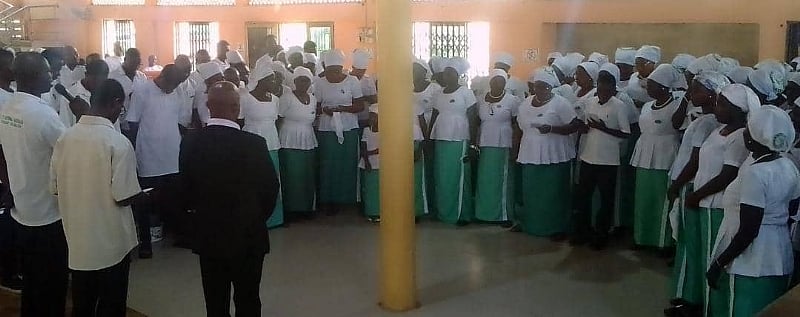The Evangelical Presbyterian Church, Ghana, Ho East Presbytery, successfully orchestrated its 4th Biennial Rally, a significant event for the Zone One Great Choir. Hosted in Taviefe Avenya, Ho Municipality, the three-day gathering united choirs from across the presbytery in a vibrant celebration of faith, music, and community development. The rally’s theme, “Care for God’s Creation: The Task and Mission of the Church – The Role of Hadzihaga,” emphasized the critical importance of environmental stewardship, prompting participants to contemplate the church’s and its members’ roles in safeguarding and nurturing the environment. This emphasis on environmental responsibility underscores the church’s commitment to holistic ministry, addressing not only spiritual needs but also the well-being of the planet. The rally served as a platform for fostering environmental consciousness, encouraging proactive engagement in conservation efforts within the community and beyond.
A key highlight of the rally was its focus on youth empowerment, a cornerstone of the Zone One Great Choir’s activities. Madam Norah Adzoe, President of Zone One, emphasized the rally’s dual purpose: reviving the passion for choral music and instilling a sense of responsibility in younger generations. She underscored that empowering youth is crucial for the church’s continued growth and sustainability. This commitment to youth development reflects the church’s understanding that investing in the next generation is vital for its future. By equipping young people with skills and opportunities, the church aims to ensure its vitality and relevance for years to come. This forward-looking approach recognizes the changing dynamics of society and the need to adapt to meet the evolving needs of its members.
The Zone One Great Choir’s commitment to youth empowerment extends beyond mere rhetoric. Last year, the choir embarked on a beekeeping venture, culminating in a successful harvest of four gallons of honey. The revenue generated from the honey sales is earmarked for a new training program designed to empower young members with valuable entrepreneurial skills. This initiative exemplifies the choir’s proactive approach to youth development. By engaging in tangible income-generating activities, they not only provide practical skills but also demonstrate the value of hard work and resourcefulness. The beekeeping project serves as a model for sustainable development, demonstrating how local resources can be utilized to create opportunities for growth and self-reliance.
The youth empowerment training program will focus on equipping participants with business skills in various areas, including soap making, organic fertilizer production, and bead making. These chosen areas reflect a conscious effort to utilize readily available resources and cater to local market demands. By providing training in these specific skills, the program aims to create direct income-generating opportunities for young people, fostering economic independence and contributing to the overall well-being of the community. Twelve young participants, selected from different groups within the Zone, will be enrolled in the program, benefiting from the guidance of an experienced resource person. This structured mentorship program will ensure that participants receive adequate support and guidance as they develop their entrepreneurial skills.
Togbe Akpanya III, Chief of Taviefe Aviefe Avedome, delivered a powerful message of solidarity, urging the church to prioritize environmental stewardship. He warned of the dire consequences of neglecting the environment and emphasized the need for collective action in preserving God’s creation. This collaborative approach between the church and traditional leadership highlights the shared responsibility for environmental sustainability. By working together, they aim to create a stronger, more resilient community that values and protects its natural resources. The chief’s message underscores the importance of integrating environmental concerns into all aspects of community life, recognizing that the well-being of the environment is inextricably linked to the well-being of the people.
Rev. W. K. Klutse, in his sermon on “Reconciliation,” emphasized the importance of unity among church members, stressing that obedience to God’s word is essential for the church’s progress. This message of unity and obedience served as a spiritual anchor for the rally, reminding participants of the core values that underpin their collective efforts. By fostering a spirit of unity and encouraging adherence to scriptural principles, the church aims to strengthen its internal bonds and effectively carry out its mission both within and outside its walls. The theme of reconciliation underscored the importance of resolving internal conflicts and working together towards shared goals.
Beyond the choral performances and spiritual reflections, the rally also incorporated outreach activities that demonstrated the church’s commitment to serving the wider community. These activities included visits to sick and less privileged community members, accompanied by donations to support their well-being. This hands-on approach to community engagement reflects the church’s belief in practical Christianity, demonstrating compassion and providing tangible support to those in need. By reaching out to vulnerable members of the community, the church aims to be a source of comfort and encouragement, embodying the spirit of Christ’s love and service.
The engagement with traditional leaders further strengthened communal ties, highlighting the importance of collaboration between religious and traditional institutions. By fostering these relationships, the church aims to build bridges and create a more cohesive community where both spiritual and cultural values are respected and upheld. This collaborative approach recognizes the significant role that traditional leaders play in community life and seeks to leverage their influence to promote positive change.
The 4th Biennial Rally was a resounding success, raising over Ten Thousand Ghana Cedis (GHS 10,000.00) to launch the youth empowerment project. This achievement is a testament to the church’s dedication to both spiritual growth and practical development. The significant funds raised demonstrate the community’s commitment to investing in the future of its young people. By equipping young members with entrepreneurial skills, the church aims to ensure a sustainable future for them and contribute to the overall economic development of the community. This holistic approach to ministry recognizes the interconnectedness of spiritual, social, and economic well-being.


